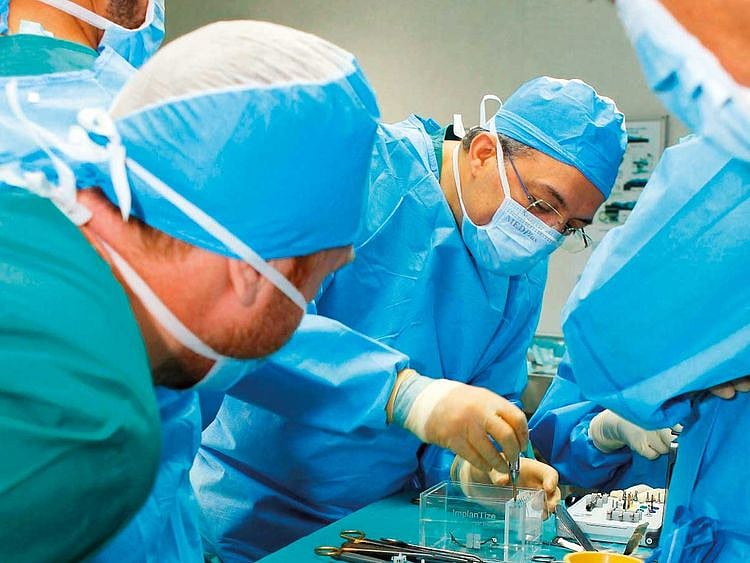Doctors in Dubai gave a 17-year-old schoolgirl and her family the opportunity to smile again in March when they fitted the teenager with a new jaw 3D-printed from bio-compatible titanium. Experts from Rashid Hospital collaborated with Dubai Health Authority’s Primary Healthcare Centre and the health startup Sinterex to save the patient’s jaw, which had been eaten away by an aggressive tumour. The condition, called an ossifying fibroma, required the entire right side of her jaw to be removed, but the girl’s chance of a normal life has since been restored.
The new procedure is an example of the way the technologies of the fourth industrial revolution are transforming paediatrics in healthcare practices across the UAE. Throughout medical history, physicians have traditionally trusted their own senses in order to correctly diagnose and monitor illnesses. Now, advancements such as artificial intelligence (AI), 3D printing, robotics and nanotechnology offer doctors an increasingly detailed picture of the progression and evolution of an illness, while indicating solutions that are often based on patients’ biomarkers and even genetics.
Growth track
The UAE is the largest market for paediatric medical devices in the region, according to the analyst Market Research Future. A high incidence of chronic illnesses among children combined with government support for the development of novel therapies are seeing hospitals and clinics in the country and around the region invest in new diagnostic and treatment devices to cater to a market that has often relied on solutions in more developed facilities overseas. Over the five-year period to 2023, the sector is forecast to expand at a compound annual growth rate of 10.5 per cent in the Middle East and Africa.
“New technology is emerging every day in the field of medicine aiming at making it more safe for the patient and easier for the doctor to reach the diagnosis while also saving a lot of time in providing faster and more efficient service to the patient,” says Dr Arkan Harb Al Huneiti, Consultant Paediatric Orthopedic and Spine Surgeon at Burjeel Hospital for Advanced Surgery, Dubai.
“In recent advancements, the new 3D modelling technology will change the face of medicine. Having the ability to formulate the full picture makes it safe and easy to improve on the modality of treatment, especially in the surgical field.”
AI and IoT
Elsewhere, Aster DM Healthcare already employs solutions running on artificial intelligence (AI) and the internet of things (IoT), with several different applications in paediatric diagnostics, radiology, pathology, monitoring and treatment, says Dr Sherbaz Bichu, CEO, Aster Hospitals. He offers the example of closed-loop medication administration, a fully electronic treatment delivery mechanism first implemented in ambulatory settings. “Closed-loop medication administration, powered by IoT-based mobile computing, ensures that the right medicine is given to the right patient at the right time,” Dr Bichu says.
Aster also uses IoT-based devices to reduce turnaround time — for investigations in the case of closed-loop sample collections, and for monitoring and treatment, so physicians can track patients’ blood glucose levels or other health indicators from anywhere.
“With the use of AI, implementation of automation and digitalisation, we ensure low error rate compared to humans,” adds Dr Bichu.
In paediatrics, deploying the latest solutions also helps minimise patients’ apprehension, explains Dr Darakhshanda Khurram, Consultant Paediatric Ophthalmologist at Moorfields Eye Hospital Dubai. “We use the latest advanced equipment in ophthalmology to make the daunting experience of having an eye examination less overwhelming for our young patients,” she says. Moorfields has also developed its own AI software for reading retinal images at its London branch, and the technology could soon make its way to the UAE.
For other providers, embracing these technologies serves to differentiation them from their competitors. “The Canadian Specialist Hospital (CSH) has been at the forefront of innovative technologies since its inception,” says Dr Yashar Ali, CEO, Canadian Specialist Hospital. “The surgery center at the Canadian Specialist Hospital (CSH) is one of the largest, most technologically advanced private facilities in the GCC. Ours is one of the few hospitals in the region that has dual-plane, full-body catheterisation visualisation equipment. This state-of-the-art technology allows the doctor to see not only the heart but also veins and arteries that may be blocked in other parts of the body.
“On the other hand, our neurosurgeons utilise advanced technology such as microscopic neurosurgery to ensure an accurate treatment of tiny nerves and vessels.”
As more healthcare providers seek to harness dynamic new technological solutions for improved patient well-being, more UAE children could soon access solutions to their health needs right here at home.
Sign up for the Daily Briefing
Get the latest news and updates straight to your inbox
Network Links
GN StoreDownload our app
© Al Nisr Publishing LLC 2026. All rights reserved.
